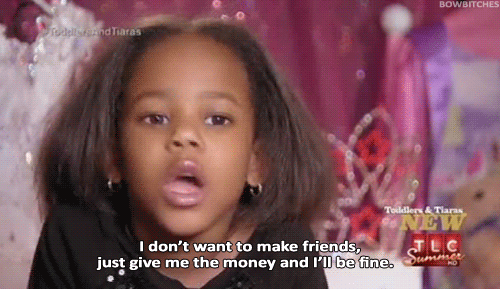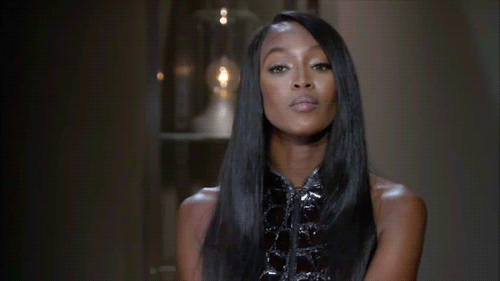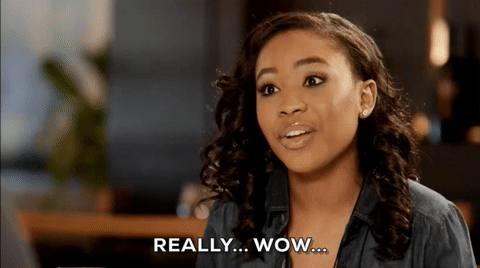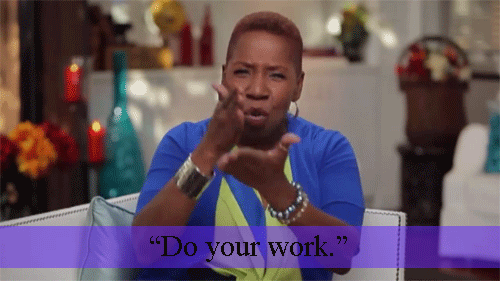
As early as elementary school, I remember taking the twenty-minute ride to Philly's Temple Hospital with my father every evening to pick up my mom from work where she'd be waiting for us on the bench by the back entrance every single time eager to leave the work day behind.
I lost count of how many times I witnessed them make complete U-turns in the cereal aisle when spotting patients they recognized from their hospital jobs, which sent a message about their values when it came to the workplace loud and clear:
Keep your personal and professional life separate.
In fact, build a brick wall complete with floodlights and layered security between the two.
It wasn't because they were ashamed or had anything to hide. As I grew older, it became clear that it was protective measure that ensured the less people have access to your personal life, the less they are able to use against you. Now, as I head to work each day, I've noticed I've adopted a similar attitude where I want work to be more about handling business and less about making BFF's. In my cubicle you'll find more post-it notes than pictures of my daughter. Most days, the mantra I chant through the work day is, "I'm here to make money, not friends."
Because the truth is, when you've built a bitter relationship with the 9-5 struggle, you hit a point when you're over the obligatory small talk at the Keurig.
The limited amount of energy that becomes your life when you're a working mom leads you to prioritize who is worth investing your time, effort, and energy into and, most days, it's not Suzanne from HR.
A recent article published in Harvard Business Review revealed that I'm not alone when it comes to being protective over my personal life as it pertains to the hustle and bustle of the work day. "Why Black Employees Hesitate To Open Up About Themselves" takes a look at an African-American employee at an international bank who, despite exceeding expectations with his work performance, was passed over for promotions repeatedly before he finally got the nerve to discuss the issue with his supervisor. The supervisor's response? "You are really good at your job, but the problem is that the partners feel they don't really know you."
Afterwards, the employee set out with a goal of engaging in more social activities like staff lunches and fantasy sports competitions, all in the hopes of relationship-building, which he says eventually led to growth in his professional career.
Now, before you can finish saying, "Ain't that about some bulls**t," anyone who has worked in the corporate world is familiar with the office politics of socializing and schmoozing your way to a promotion and/or pay raise. But how do you find the balance between being personable without being fake or phony? How do you maintain friendly and respectful relationships at work while still allowing some distance so that work doesn't feel so closely connected to your personal happiness and self-worth?
It's something I found myself forced to explore when a lay-off I experienced left me unemployed and questioning my whole identity. I enjoyed the work I did at the time and, for the most part, the people I got to do it with, but after the lay-off, I was left asking myself questions like, "Was my manager jealous of my side-hustle as a writer? Maybe I shouldn't have divulged that info to someone I soon learned had secret celebrity blogging dreams of their own."
When I learned that supervisors had pretty much laid off their entire staff at the small non-profit to maintain their six-figure salaries, I felt violated. What good was that conversation about my baby's favorite foods if at that end of the day you didn't give a damn about how I'd pay for it? Everyone won't have my same experience, but the situation taught me that work should only be but so intertwined with your personal life. In the event you're stripped of your position, you still want to be able to have a healthy sense of self and feel like the connection you had with people you once engaged with every day for eight hours wasn't all in vain.
The article goes on to state that finding the balance between the personal and professional can especially be a struggle for African-Americans. Many of us were raised in a culture that encourages keeping private business behind closed doors, and in the work space, when many of us are already navigating microaggressions and racial boundaries, shooting the s**t can be more difficult than necessary. For example, my sister and I can talk about Chris Rock's latest stand-up special and find the same jokes funny, but Kathy from Accounting might be offended and the next thing you know, I'll be sitting in front of Suzanne from HR wondering if this will affect my paycheck.
The piece explains that with disclosure comes risk, and it's not just African-Americans who have reservations:
"Opening yourself to others requires risk taking and trust, but without it employees are less likely to build the deeper relationships that lead both to success and to more happiness at work. Our research focuses on African-Americans, but this dynamic applies to the acclimation and professional trajectories of all those who find themselves in the minority at work, including working mothers, older employees at youth-oriented start-ups, and people whose conservative political views make them feel like outliers in organizations dominated by liberals or progressives."
It's not always necessarily about being anti-social either.
I have made friends at work in the past that I've talked to both on and off the clock. I've enjoyed happy hours, holiday parties, and even playdates with colleagues who I developed friendships organically with. But admittedly, it's been difficult for me to navigate the idea of small talk leading to career success. I've always felt like my work should speak for itself and I should be afforded opportunities that were a good match for my talent and work style than just because me and a manager both love Black Ink Chicago. But the authors of the piece say that half-priced margaritas with your manager may just be a necessary rung on the career ladder, and research shows that it's not that people of color aren't turning up with their colleagues, it's that they don't always feel comfortable being themselves while doing so:
"The problem is not that minorities fail to show up for such outings."
"However, in our surveys, minorities are more likely than others to report attending out of a sense of obligation or a fear of negative career consequences if they don't appear."
The studies also confirm that differences aside, attitude is everything and the fact of the matter is if you're only showing up to happy hour out of obligation and not due to organically formed connections, it shows:
"Regardless of race, people who would prefer to skip such events typically come away feeling no more connected to colleagues than when they walked in the door."
Also, when it comes to connecting to colleagues it can be a struggle to find safe things to talk about that doesn't make working next to a person eight hours a day uncomfortable.
Many employees fear that sharing personal details about their lives invites a situation where that info can be used against them.
I've sat in meetings where managers have discussed laying off the co-worker whose husband makes a decent salary before the single mother whose one missed paycheck away from a shut-off notice. Regardless of your performance and how much personal info should or shouldn't affect career opportunities, I think it's always best to proceed with caution when it comes to being an open book at work.
When it comes to balancing your personal and professional life, the advice I can relate to the most in the piece is you have to be comfortable with yourself. Regardless of how disenchanted I have ever been in a position, I've always found that the people I am drawn to the most are those who are authentic. For every colleague who's ever responded with, "Who?" when I've mentioned my love for all things Iyanla Vanzant, there has been another screaming from the printer, "You have to do the work, beloved!"
When you stay true to what drives you in your career and who you are the connections and opportunities will come, and more importantly, they will come from the people and places that are right for you. In the article, a black woman who goes by "Karen" recalls several white colleagues asking her what she did for her birthday one year and how hesitant she was to share about attending a Kirk Franklin concert because they probably didn't even know who the gospel artist was. The moment was significant to her because she realized any position worth having is one where your unique skill set, background, and outlook are welcomed and not discouraged:
"If I am not comfortable with who I am, the music I like, the places I like to go, how can I expect my coworker to value me for who I am? What is so wrong with being excited about Kirk Franklin?"
When it comes to navigating the nuances of your career growth, it helps to create boundaries and rules that keep you safe, motivated, and work for your individual path as a professional. You also have to understand that with growth comes risk and challenging yourself out of your comfort zone once in a while. Work shouldn't be a place where you're uncomfortable being yourself, and adapting to new people and outlooks can be intimidating, but scary doesn't always mean wrong.
It's as simple as being able to bring your distinct identity to your position, without making a mess where you make your money.
With that said, I'm not accepting your friend request unless we've actually had a conversation that wasn't about weather, the Academy Awards, or my awesome "ethnic" hairstyle. You don't get a happy hour invite until I've heard you independently state that you can't stand those squeaky ass shoes our manager wears. And lastly, you can't judge me for listening to Young Jeezy and selling coke in my head until the very last second before I start my shift.
Featured image by Shutterstock
- What to Do When a Personal Crisis Is Hurting Your Professional Life ›
- 12 Simple Habits That Will Make Your Professional Life and ... ›
- Manage Your Work, Manage Your Life ›
- How to balance your personal and professional life | Ladders ... ›
- Thirteen tips for separating your personal and professional life - The ... ›
- 6 Personal Philosophies That Shaped Successful Entrepreneurs ›
- The difference between personal and professional ethics ... ›
- 5 Tips To Separate Personal And Professional Life Online ›
- 5 Ways to Balance Your Professional and Personal Life - wikiHow ›
- When Professional and Personal Lives Collide | Fox Business ›
This Is How To Keep 'Holiday Season Stress' From Infecting Your Relationship
Hmph. Maybe it’s just me, but it seems like there is something really weird happening in the fall season air (because winter doesn’t officially begin until December 21) that cuddle season is in full swing while break-up season is as well. In fact, did you know that break-ups are so popular during the holiday season that December 11 is deemed Break-Up Day?
The reasons why relationships shift around this time vary; however, I did both roll my eyes and chuckle when I read that a very popular one is because it’s an easy way to get out of getting one’s significant other a Christmas present. SMDH.
Anyway, I personally think that the less shallow folks out here may contemplate calling things “quits” or they at least distance themselves a bit from their partner (and what I’m referring to is serious relationships) due to all of the stress and strain that oftentimes comes with the holidays whether it be financial, familial, due to their tight schedules or something else.
Listen, I would hate for you and your man to miss the fun and happiness of experiencing this time of year, all because you are so overwhelmed or irritated that you can’t really enjoy it. That’s why I have a few practical tips for how to avoid allowing the typical holiday season stress from INFECTING your relationship.
Manage Your Expectations
 Giphy
GiphyUnmanaged expectations. If there is a main reason why the holiday season tends to be so stress-filled for so many people, I’d bet good money that this is the cause. And when you’re in a long-term relationship, expectations can manifest themselves in all sorts of cryptic and/or unexpected ways. You might have relatives who assume that you are going to be with them for Thanksgiving or Christmas when you have other plans in mind. You might be thinking that you are going to spend one amount for presents while your man is thinking something totally different. When it comes to scheduling, your signals may be crossed.
And you know what? To all of these scenarios, this is where clear and consistent communication come in. Don’t assume anything. Don’t dictate anything either. From now until New Year’s, mutually decide to check in once a week, just to make sure that you are both on the same page as it relates to the holidays and what you both are thinking will come along with it. The less blindsided you both feel, the less stressed out you will be. Trust me on this.
Set (and Keep) a Budget
 Giphy
GiphyOkay, so I read that last year, 36 percent of Americans incurred some type of holiday-related debt. Hmph. Last year, there was still some sense of normalcy in this country, chile, so I can only imagine what finances are gonna look like over the next several weeks. That said, since I don’t know a lot of people who don’t find being broke stressful, make sure that you and your bae set a budget and then stick to it this year — no ifs, ands or buts.
Because really, y’all — it doesn’t make sense to deplete savings and/or max out credit cards for a few days of giggles only to be damn near losing your mind because you don’t know how to make ends meet come Dr. Martin Luther King, Jr. Day.
And by the way, this tip doesn’t just speak to things like food and gifts; I also mean travel. If it doesn’t make a ton of sense (or cents) to be all over the place this year — DON’T BE.
Keep Matthew 5:37 at the Forefront
 Giphy
GiphyIf off the top of your head, you don’t know what Matthew 5:37 says, no worries, here ya go: “But let your ‘Yes’ be ‘Yes,’ and your ‘No,’ ‘No.’ For whatever is more than these is from the evil one.” That verse right there? Oh, it’s a boundaries lifesaver! I say that because do you see “maybe” or “I’ll think about it” in there? Nope. LOL. It says that you should tell people “yes” or “no” and leave it at that — and that complements Anne Lamott’s quote, “’No’ is a complete sentence” impeccably well. Yeah, you’ve got to remember that anything beyond a yes or no to a request is privileged information; you don’t owe anyone details or an explanation.
Besides, if you are really honest with yourself, when someone asks you something and you give a “Umm, let me think about it” kind of reply, more times than not, you already know what your answer is going to be — so why not let you both off of the hook? Give your response. Commit to that. And let everyone (including yourself) get on with their lives and schedules.
I promise you that when it comes to those holiday parties, you are pissing more folks off by not RSVP’ing or doing so and not showing up than just saying, “Thank you but not this year” off the rip.
Remember That Your Personal Space Is Privilege Not a Right
 Giphy
GiphyA friend of mine recently bought a new house and invited me over to come see it. He’s a single man with no children, so as I was taking in all of the space that he had, especially as I walked through his finished basement, I joked about relatives coming to live with him. “Hell no” and “absolutely not” were pretty much his immediate responses as he went on to say that some folks even had the nerve to be offended when he told them that he had no intentions on taking DNA in.
Ain’t it wild how people think that your stuff is their right? And yes, that brings me to my next point. Your home is your sanctuary space. If you want to host folks this year — cool. If not, ALSO COOL. Please don’t let folks (family included) guilt you into how they want you to act or even into what they would do if the shoe was on the other foot. You are not them — and as one of my favorite quotes states, “If two people were exactly alike, one of them would be unnecessary.” (A man by the name Larry Dixon said that.)
Hell, my friends? They know that I am good for sending them random things that they need or even want all throughout the year. Coming over to hang out at my pace, though. Uh-uh. Chalk it up to being a card-carrying member of the ambivert club yet I like keeping my living space personal — and I sleep like a baby, each and every night, for feeling that way.
Always remember that your space, your time, your resources, your energy and shoot, yourself period (including your relationship), are all things that are your own. You get to choose how, when and why you want to share them. The holiday season is certainly no exception.
Cultivate Some “You Two Only” Traditions
 Giphy
GiphyIt’s not uncommon for some couples to hit me up after the holiday season to “detox.” Sometimes it’s due to the financial drama (and sometimes trauma) that they experienced. Sometimes it’s because they allowed their relatives (especially in-laws) to get more into their personal business than they should’ve. More than anything, though, it tends to be because they didn’t get enough quality time together and so ended up feeling “disconnected.”
Please don’t let that happen. Listen, I’m not even a holidays kind of woman and yet, I will absolutely sit myself down with some hot chocolate and chocolate chip cookies to enjoy a Hallmark holiday film or two. Aside from the fact that most of them are lighthearted and sweet, I also like that they usually focus on couples loving on each other amidst all of the holiday beauty and ambiance — which is something that all couples should set aside some time to do.
Maybe it’s a vacation. Maybe it’s a staycation. Or maybe it’s my personal favorite, A SEXCATION. Whether it’s for a few days, the weekend or even overnight — don’t you let the holidays go by without setting aside time for you and your man to celebrate one another. Don’t you dare (check out “Are You Ready To Have Some Very Merry 'Christmas Sex'?”).
GET. SOME. REST.
 Giphy
GiphyI once read that 8 out of 10 people get stressed out over the holidays and 3 out of 10 lose sleep during to it — and when you’re stress-filled and sleep-deprived, that can absolutely lead to hypersensitivity, making mountains out of molehills and even not being in the mood for sex.
Your relationship can’t afford to go through any of this, so definitely make sure to prioritize rest. I don’t care how unrealistic it might seem during this time, sleep should never be seen as a luxury; it will always and forever be a great necessity.
That said, try to get no less than six hours of shut-eye in (check out “6 Fascinating Ways Sex And Sleep Definitely Go Hand In Hand”) and even ask your bae to take a nap with you sometimes (check out “Wanna Have Some Next-Level Sex? Take A Nap, Sis.”). Not only will sleep help to restore your mind, body and spirit but, when it’s with your partner, it’s an act of intimacy that can make you both feel super connected, even in the midst of what might feel like chaos.
___
Holiday season stress is real. Still, never give it the permission or power to throw your relationship off. Put you and your man first and let the holidays be what they are gonna be, chile.
Let’s make things inbox official! Sign up for the xoNecole newsletter for love, wellness, career, and exclusive content delivered straight to your inbox.
Featured image by Shutterstock
While doing a podcast interview a couple of weeks ago, when I said my age, the interviewer complimented me by saying that what I said is not what they would’ve guessed. When they asked what the secret was, the first thing that came out of my mouth was, “Oh, I’m gonna take me a nap.”
I adore sleep. I’ve said before that it’s like what Six Flags is to some people. And really, it’s just a plus that there are so many health benefits from getting plenty of rest. Beauty-wise, science does reveal that getting no less than seven hours a night can slow down signs of aging. Know what else? There are some direct things that sleep — and the lack thereof — can do to your immunity as well.
And so, since this is the time of year when catching a cold (and/or the flu) is common, let’s talk about the impact that sleep (and again, a lack thereof) has on your immune system. That way, you can remain as healthy as possible during the fall and winter seasons.
1. Less Sleep Means More Colds
 Giphy
GiphyLike I stated in the intro, I’m pretty sure you’ve heard somewhere that the fall and winter are the seasons when people are most susceptible to catching a cold or coming down with the flu. And that’s exactly why I thought I would start this all off by sharing the fact that some studies reveal that if you get less than six hours of sleep, on a consistent basis, you end up making yourself more vulnerable to coming down with both. In fact, some research says that only 18 percent of people who get six-plus hours of rest caught a cold while almost 40 percent who got less than that did.
The logic behind it all is sleep gives your body time to build up the proteins and cells (like cytokines and T-cells) that you need to fight off certain viruses. So, if nothing bothers you more than having a stuffy nose or stubborn cough when it’s cold outside, getting more sleep is one way to prevent that from happening to you.
2. Less Sleep Means More Allergy Symptoms
 Giphy
GiphyAt the end of the day, an allergy is basically what transpires whenever your immune system “overreacts” to something that other people’s systems do not. And since sleep is what helps to keep your immune system nice and strong — well, I’m sure you get how less allergy-related symptoms and more sleep go hand in hand. Also, since sleep helps to decrease bodily inflammation (more on that in a bit) and inflammation can also intensify allergy symptoms, that’s just one more reason to get as much shut-eye as possible.
3. Less Sleep Means Potential Diabetes and Heart Disease
 Giphy
GiphyDid you know that in 2024, Black women were diagnosed with diabetes 24 percent more than any other adult demographic. Also, it continues to be a reality that heart disease is the leading cause of death for Black women. These two sobering statistics alone should be enough of an incentive to do whatever you can to keep the risk of diabetes and heart disease way down.
One way to do that is by getting more sleep. Aside from the fact that sleep strengthens your immune system to where it is easier for you to fight off illness and diseases, sleep can keep your blood sugar levels in a healthy space; plus, when it comes to your heart, it gives it, along with your arteries and blood vessels a break.
4. Less Sleep Means Less Time for Your Body to Push “Reset”
 Giphy
GiphyIf you really stopped to consider all that your body goes through during the day (you can read some about that here), you definitely would respect it enough to do your best to thank it by giving it no less than six hours of sleep, each and every night. Sleep is what helps to slow your brain and body down so they are able to “refuel” for the next day. After all, how can your body prevent you from getting sick if your immune system is too worn out to fight ailments off? Exactly.
5. More Sleep Helps You to Fight Off Infections
 Giphy
GiphySpeaking of, in order for your body to fight off infections, there are certain cells and antibodies within you that need to be healthy and strong — one way that they get and stay that way is by you getting a good amount of sleep. For instance, remember when I touched on cytokines earlier? Well, the same way that they help to prevent colds, they also help to prevent infections too. And since sleep lowers your cortisol (stress) levels, rest gives your body the time and space to build up an army that can fight off free radicals and other health-related challenges while you are awake.
6. More Sleep Lowers Bodily Inflammation
 Giphy
GiphyWhenever a health-related issue is mentioned on this platform, inflammation is something that is mentioned quite a bit. Probably the easiest way to explain inflammation is it’s how your body responds/reacts whenever something is happening to your body that shouldn’t be, whether it’s an illness, an injury, a germ or something that you may be allergic to.
If you happen to have chronic inflammation, some symptoms that are associated with that include fatigue, stiff joints, skin rashes, weight gain and moodiness.
The interesting thing about all of this is if you aren’t getting enough rest, you could be triggering inflammation in your body. That’s because studies reveal that a lack of sleep can elevate molecules that are associated with inflammation. So, if you don’t want inflammation to increase within your system, you should definitely catch more zzz’s.
7. More Sleep Regulates Hormones
 Giphy
GiphyWhen it comes to hormones like serotonin, estrogen and cortisol, believe it or not, they play a role in how your immune system acts and overreacts. That’s because, if your hormones are out of balance, that can cause your immune system to work harder than it actually should and that can make you more vulnerable to sickness. One way to keep your hormones leveled out? SLEEP.
That’s because sleep gives your body the opportunity to rest, repair and restore your hormone levels. On the other hand, when you are sleep deprived, that can put/keep your hormones on the ultimate roller coaster ride. #notgood
8. More Sleep Strengthens Vaccines
 flu shot GIF - Find & Share on GIPHYGiphy
flu shot GIF - Find & Share on GIPHYGiphyIf you’re someone who is good for getting some sort of vaccine around this time of the year, make sure that you rest up before and after getting your shots. Not only does adequate rest before a vaccination help your immune system to be better receptive to your shots but sleep also helps your body to build up enough antibodies to make your vaccinations effective after getting them. Because if you’re gonna get pricked, shouldn’t it be worth it? My thoughts exactly.
Get some freakin’ sleep! Your immune system depends on it.
Let’s make things inbox official! Sign up for the xoNecole newsletter for love, wellness, career, and exclusive content delivered straight to your inbox.
Featured image by Shutterstock














